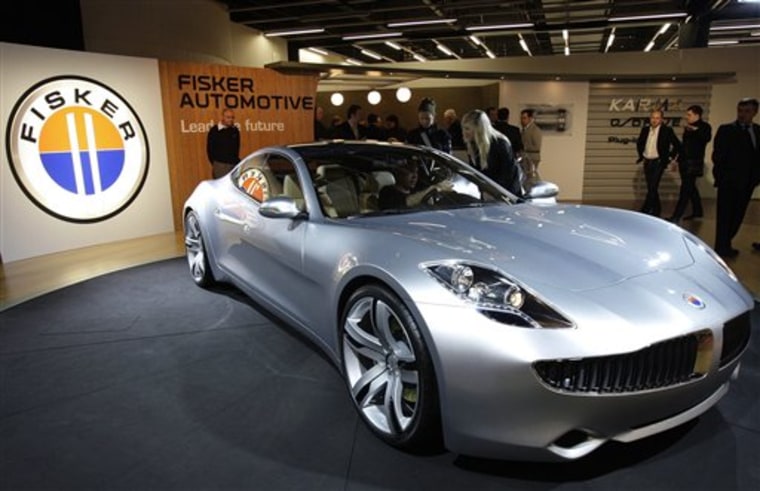Tesla Motors Inc., a Silicon Valley company that makes electric cars, has filed suit against a competing company and its founders, alleging they stole trade secrets to design a competing vehicle.
San Carlos-based Tesla recently started shipping its first vehicle, a two-door all-electric sports car called the Tesla Roadster, which has generated excitement among environmentalists and auto enthusiasts.
Last year, the company hired Fisker Coachbuild LLC, a well-known automotive design firm founded by Henrik Fisker and Bernhard Koehler, to help design the body and interior of Tesla's next vehicle, known as project White Star, a four-door sports sedan with a plug-in hybrid-electric engine.
In the lawsuit filed Monday in San Mateo County Superior Court, Tesla claims that Fisker and Koehler fraudulently accepted the design contract to gain access to Tesla's trade secrets and proprietary engineering and design information so they could develop their own hybrid sports sedan.
In a statement Tuesday, Fisker said that "the allegations set forth in the complaint are without merit and intend to defend ourselves vigorously."
Tesla paid Fisker Coachbuild about $800,000 for its design services last year, but Tesla officials said the styling work was "substandard" and decided last fall not to use it, according to the lawsuit.
Model announced in January
Then Fisker Automotive Inc., an Irvine-based company founded by Fisker and Koehler, announced in January that it was developing a luxury plug-in hybrid sports sedan called the Fisker Karma, which Tesla claims has similar specifications to White Star.
Tesla claims the defendants concealed the fact that they were working on a competing vehicle while working on the design contract, said Adam Belsky, an attorney for Tesla.
Fisker "was privvy to a lot of highly confidential information that obviously he would never have been exposed to if Tesla knew he was a competitor," Belsky said. "Tesla believes in competition as long as it's fair and ethical, but what Fisker did is not fair and not ethical."
The lawsuit against Fisker, Koehler, Fisker Coachbuild and Fisker Automotive seeks punitive damages and an injunction to bar the defendants from using Tesla trade secrets and proprietary information to develop a competing vehicle.
Fisker recently told the Associated Press that he saw a bright future for fast and efficient automobiles.
"For me it's important to create a vehicle that's so sexy you've just got to have it, and later you find out that you can go 80 kilometers (50 miles) without using any gas," Fisker said. "That's how far 75 percent of people in Europe drive every day. If all of those people drove plug-in hybrids we would get rid of all our emission problems, and our dependence on foreign oil."
Fisker said his company had been getting "between 50 and 100 orders a week" for its plug-in electric hybrid Karma sports car and that it would begin rolling off the production line in the fourth quarter of 2009.
$80,000 price tag possible
A version of the sleek, silver concept car was on display at the Geneva Auto Show earlier this year with a sticker price of $80,000 for the United States. But with a shape reminiscent of an Aston Martin, where Fisker was formerly design director, and features including a solar-paneled roof, the company sees room for big growth.
Orders are also coming from Europe, even though customers there will likely pay at least $106,000 because of higher taxes and import charges, he said.
The four-seater can travel 50 miles on a single battery charge. When the battery empties, the car automatically activates a one-gallon fuel engine that generates enough electricity to power the car a further 450 miles.
Fisker said the Karma uses a new type of lithium-ion battery that does not suffer from the overheating problems that have caused large auto manufacturers to shy away from the technology.
Fisker's battery can be fully recharged in three and a half hours. The solar panels come in handy when the car is parked in the sun, providing enough energy to nudge up the battery charge and simultaneously cool the inside cabin.
The car will be built somewhere in the United States, he said. Fisker will not set up its own factory, but is in talks with "German and American car companies" about manufacturing.
The company says its Karma has a top speed of 125 miles per hour and can go from 0-60 mph in six seconds.
But the electric motor also has an unexpected side effect: It is completely silent, which might worry pedestrians with bad eyesight and disappoint sports car freaks keen to hear the roar of their machines.
Fisker said the solution is speakers the company has added inside and outside the vehicle. One option will allow drivers to make their car sound "like something between a Formula One car and a jet plane," and certainly loud enough to be heard by pedestrians.
A gimmick? Fisker said most car makers already tinker with the sound of the engine. "It's been enhanced and manipulated to make sure it sounds good," he said. "Part of any experience is the acoustic experience."
